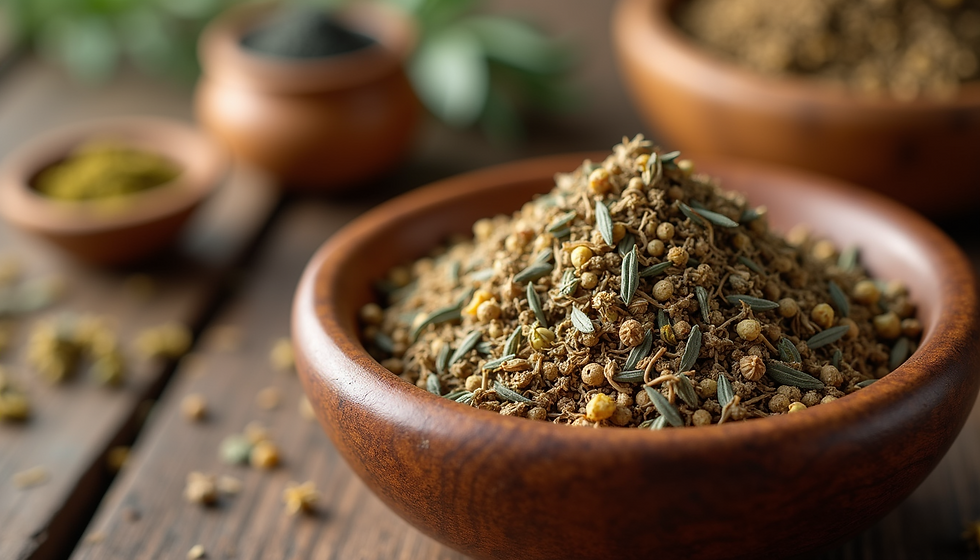Transform Your Health with Top Ayurvedic Daily Practices
- Shreyash Nagane
- Nov 17, 2025
- 3 min read
In the journey toward holistic wellness, embracing daily Ayurveda practices can be a gentle yet powerful way to nurture your body, mind, and spirit. Ayurveda, the ancient Indian system of natural healing, offers simple routines that align with nature’s rhythms. These routines help maintain balance and promote long-lasting health. In Ayurveda, this daily routine is called Dinacharya. I have found that incorporating these practices into my daily life brings a sense of calm, clarity, and vitality that is truly rewarding.
Your Ayurvedic Morning Rituals (Ushah-Kala) for a Vital Day
Starting your day with intention and care is a cornerstone of Ayurveda. The daily Ayurveda practices encourage us to honor our body’s natural cycles.
1. Wake Up Before Sunrise
Waking up early, ideally before sunrise, allows you to sync with the fresh, light energy of the morning. This simple act can set a positive and peaceful tone for the entire day.
2. Cleanse Your Body & Senses
After waking, engage in these self-care rituals to gently cleanse the body:
Jihwa Prakshalana (Tongue Scraping):
Gently scrape your tongue to remove the toxins ('ama') that accumulate overnight. This improves digestion and freshens your breath.
Gandusha (Oil Pulling):
Swish sesame or coconut oil in your mouth to support oral health and detoxification.
Eyewash with Triphala:
Gently wash your eyes with Triphala-infused water or pure rose water. This simple act helps to cool, soothe, and balance the doshas in your eyes, promoting clarity.
Nasya (Nasal Lubrication):
Administer 3-5 drops of warm ghee or sesame oil into each nostril. This practice, known as Nasya, lubricates the nose, cleans the sinuses, improves vision, and helps boost memory.

3. Nourish Your Body with Abhyanga (Self-Massage)
Before your morning bath, perform a full-body self-massage with warm sesame oil. This practice, Abhyanga, is deeply nourishing. It calms the nervous system, improves circulation, relaxes muscles, and tones the skin, preparing you beautifully for the day ahead.
4. Hydrate with Warm Water
According to Ayurveda, the first thing you consume in the morning should be a glass of warm water. This helps to flush out toxins, hydrate the body, and gently kick-starts the digestive system or 'Agni' (digestive fire), which is central to good health.
5. Gentle Movement & Breathing (Pranayama)
Center your mind with a few minutes of mindful breathing exercises or gentle yoga. This practice calms the nervous system and prepares you to face the day with clarity and calmness.
What Should I Eat? An Ayurvedic Approach to Daily Diet
Your First Meal: A Light & Warm Breakfast
Following your morning rituals, a light, nourishing breakfast is recommended. Foods that are easy to digest and warm, such as moong dal porridge or spiced herbal teas, are ideal. These foods support your Agni. Avoid cold or heavy foods early in the day, as they can dampen digestion.
The Midday Meal: Eat Your Largest Meal at Lunch
Ayurveda recommends eating your largest meal at midday when your digestive fire is at its strongest. This allows your body to efficiently digest and absorb nutrients.
The Evening Meal: Light and Easy to Digest
Eat a lighter meal in the evening to prepare the body for restful sleep. This allows your digestive system to rest overnight. For a diet plan tailored to your unique constitution, consider a personalized wellness consultation.

Evening and Nighttime Rituals for Restorative Sleep (Ratri-Charya)
As the day winds down, calming activities prepare the body for rest. Avoid heavy meals and screen time at least an hour before bed.
1. The Grounding Practice of Padabhyanga (Foot Massage)
Before sleep, take a few minutes to massage warm sesame oil onto the soles of your feet. This practice, Padabhyanga, is deeply relaxing. It grounds your energy, calms the mind, and is especially beneficial for improving both eye health and foot health, ensuring you drift into a peaceful, restorative sleep. These evening rituals are foundational in our Panchakarma therapy benefits, which focus on deep detoxification and rejuvenation.
2. Create a Consistent Bedtime
Creating a consistent bedtime routine helps regulate your internal clock. Going to bed early, ideally by 10 PM, aligns with the natural cycles of the body and promotes deep, restorative sleep.
Integrating Ayurvedic Wisdom into Your Modern Life
Incorporating these ayurvedic daily practices into your routine does not require drastic changes. It is about gentle adjustments that honor your body’s needs. Start small and listen to your body to find your unique balance.
By embracing these daily rituals, you invite harmony and vitality into your life. This holistic approach supports not only physical health but also emotional and mental well-being. I hope these insights inspire you. If you wish to deepen your understanding and receive guidance tailored to your specific needs, I invite you to schedule a holistic health consultation with me today. Together, we can create a personalized path to your well-being.



Comments